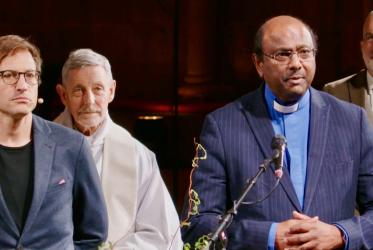By Peter Kenny*
Advocacy for women’s rights and the fight against gender-based violence is not only a concern for women but crucial for the whole of humanity and more men need to get involved. This was one of the key emphases at the annual advocacy training for faith-based organizations (FBOs) at the Ecumenical Center in Geneva.
The Lutheran World Federation (LWF) and the World Council and Churches (WCC), which co-hosted the 4-7 July training with Church of Sweden, Finn Church Aid, and Mission 21, affirmed commitment for greater engagement of their respective constituencies.
At the training, delegates heard from panel speakers about the international advocacy of faith-based organizations (FBO) in women’s rights and gained knowledge about the United Nations (UN) instruments for human rights.
Overall, the participants welcomed the inter-linkage of FBOs’ work with the UN system and the Convention on the Elimination of all Forms of Discrimination Against Women (CEDAW), and the encouragement to bring women and men into the fight for women’s human rights. Appreciation was expressed for insights on how more men and boys can get involved in fighting gender-based violence, following a presentation by WCC theology consultant Prof. Ezra Chitando.
Byapari Monijinjir, program manager at the non-governmental organization Lutheran World Service India Trust, said taking part in a session of the 67th CEDAW meeting had helped her understand better the right human rights’ language and how to take forward the issue of gender rights in India.
Speaking at the event’s closing, LWF General Secretary Rev. Dr Martin Junge said, “Gender-based violence is a phenomenon that is across the world and I don’t want to leave us with the impression that this is something affecting some people out there, but that churches in the north, in the south in the west and the east have a responsibility to take it up.”
Junge’s remarks came after hearing concerns shared by the participants in regional sub-groups, where they identified the following issues as major threats to women’s human rights: all forms of fundamentalism; sexual abuse and trafficking in women and girls; poverty; and a culture of impunity and silence. However, participants also stressed the existing opportunities and strength in overcoming such challenges, saying churches and faith-based organizations are well entrenched in local communities and there is increasing awareness and collaboration with other stakeholders and the UN mechanisms.
The 50 delegates at this year’s training came from Africa, Asia and the Latin American region.
‘Do not allow yourselves to be derailed’
For the LWF general secretary, the training on women’s human rights was very much about using international instruments such as CEDAW. Junge said he was appalled at the fact that those wanting to help migrants in the Mediterranean Sea by preventing them from dying there, are increasingly being “criminalized,” and their humanitarian courage is being objected to. He compared this objection to the growing voices that are questioning and pushing aside the arguments of those speaking out against gender-based violence and advocating for women’s human rights.
“You are doing the right thing,” the LWF general secretary told delegates at the annual training. “Do not allow yourselves to be derailed from what you are doing as you engage to fight gender-based violence, advocate for women’s human rights and pursue gender justice,” he added.
Pursuing gender justice
Addressing the closing session, Stanley Noffsinger, director of the WCC Office of the General Secretariat said the council “is committed to participating in international discourse and decision making to ensure that women’s human rights are treated equitably through participation and contribution in the annual UN Commission on the Status of Women.”
On behalf of WCC General Secretary Rev. Dr Olav Fykse Tveit, he added: “I am very pleased to see men in the room, but disappointed that there aren’t more men joining in this conversation, because the topic you are engaged in should have the highest priority for men as well as women … if there is to be dignity, justice and trust for all people on this earth.”
Noffsinger said the WCC was committed to pursuing gender justice through its Gender Advisory Group including working towards a gender justice policy.
He thanked the participants for turning out in black attire on 6 July for the #ThursdaysinBlack worldwide campaign, started by the WCC and partner organizations, where people wear black every Thursday to speak out against all forms of sexual and gender-based violence.
*Peter Kenny is a journalist and communications consultant. He writes for Ecumenical News, The Wall Street Journal, The Star in Johannesburg and other media organizations.






